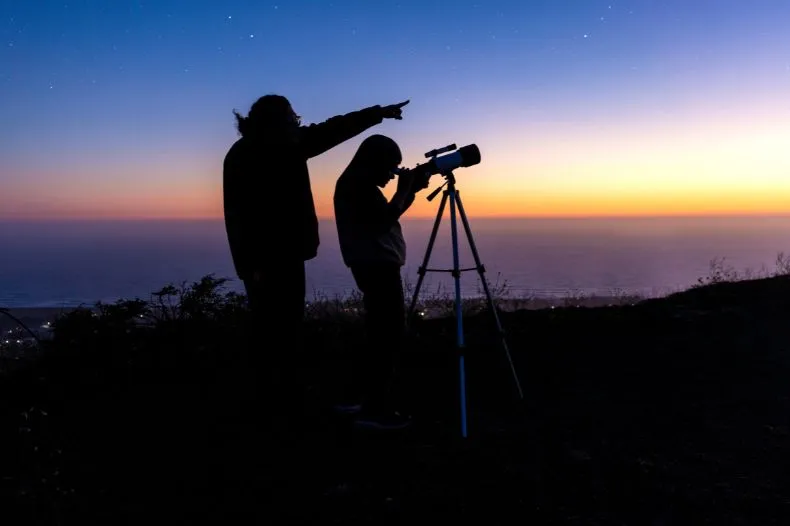
Best Stargazing in Denver, often known as the Mile-High City, entices stargazers with a cosmic display fashioned by its high altitude, pristine skies, and variety of astronomy locations.
Denver’s high altitude of 5,280 feet above sea level presents a clear benefit, cutting down on atmospheric interference and offering an unmatched canvas for views of the night sky.
Denver, the home of storied observatories like the Chamberlin Observatory on the University of Denver campus, skillfully combines the beauties of astronomy with the urban environment.
This guide covers the best places in the city to see stars at night, including higher-altitude treasures like Mount Evans and well-known locations like Red Rocks Amphitheatre.
We travel outside of cities into places with dark skies, like Westcliffe and Silver Cliff, where residents’ dedication to reducing light pollution makes for ideal stargazing environments.
Together with exploring the best stargazing in Denver, we’ll also talk about helpful hints, calendars of astronomical events, and the community that local astronomy groups provide.
Denver’s night skies promise an enthralling voyage through the wonders of the universe, regardless of your level of experience with astronomy or your desire to learn more about the cosmos. Come along as we reveal the top stargazing spots in the Rocky Mountain region.
Elevation Advantage:
Denver’s prominent elevation of 5,280 feet above sea level offers a unique benefit to those who enjoy stargazing. Stargazers may see more of the universe from the city’s elevated location, which also provides a rare viewpoint above most of Earth’s atmospheric interference.
Because of the thinner atmosphere at higher altitudes, vision is improved and light scattering is minimized. Because of this occurrence, light pollution is reduced and celestial objects can be seen more clearly against the night sky.
Denver’s altitude serves as a natural filter, making the atmosphere ideal for stargazing and other cosmic delights.
The Mile-High City’s altitude adds to an immersive astronomy experience, whether you explore the city’s observatories or head to higher terrain like Mount Evans.
Best Stargazing In Denver: Top Spots
Denver is a great place for both novice and experienced astronomers to begin their celestial explorations because of its height advantage and dedication to maintaining dark skies. So enjoy the altitude, lift your head, and be in awe at the universe’s splendor from Denver’s higher altitude. Here are the best places for Stargazing in Denver:
Denver Observatories
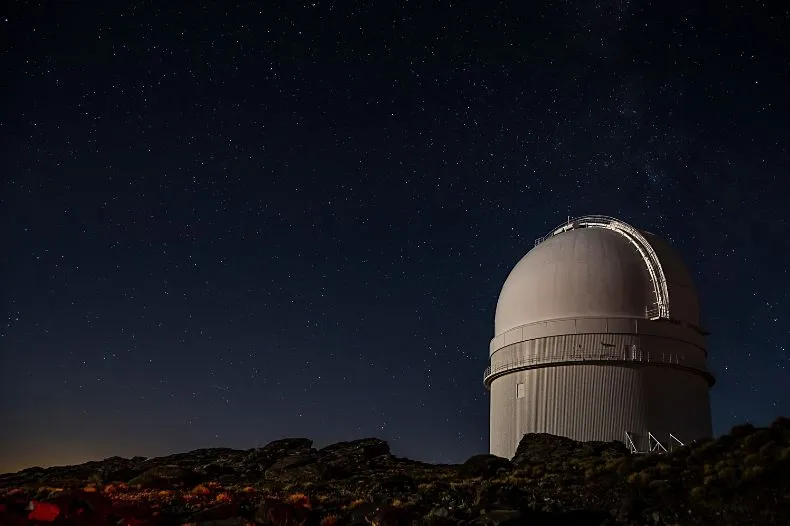
With its observatories, Denver provides both locals and tourists with fascinating astronomy experiences that provide a view into the mysteries of space. The Chamberlin Observatory is a shining example of a celestial exploration facility among these.
Located on the University of Denver campus, this historic observatory offers unparalleled views of planets, galaxies, and other celestial phenomena thanks to its impressive 20-inch refracting telescope.
During planned viewing nights, the Chamberlin Observatory frequently opens its doors to the public, letting astronomy enthusiasts see through this famous telescope.
Under the city lights, visitors can interact with experienced astronomers who provide insights and lead observations, resulting in an inspiring and instructive experience.
These observatories provide as entrance points to the expanse of the night sky for individuals looking for a celestial adventure outside of Denver’s urban surroundings.
Denver’s observatories provide a window into the wonders of the cosmos, inspiring awe and admiration for the cosmic tapestry overhead, regardless of astronomy experience level.
Approx Travel Time: 15 min
Distance: 7.8 miles
Red Rocks Amphitheatre
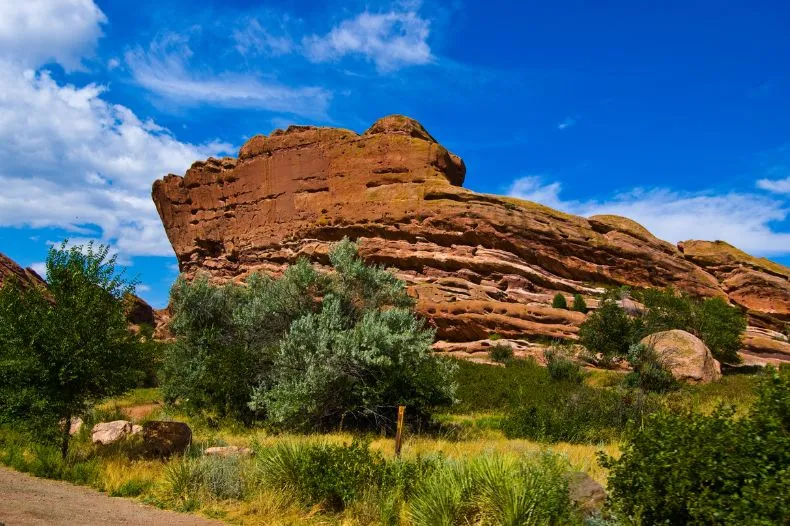
Denver’s Red Rocks Amphitheatre is well-known for concerts, but it’s also a wonderful place to see stars at night. This famous location, which is tucked away inside organic rock formations, periodically becomes an astronomical amphitheater and hosts stargazing events that let guests take in the glories of the sky.
Red Rocks provides an incredible environment for stargazing under the vast Colorado sky. The venue’s characteristic red rocks give a striking backdrop against which to see planets, constellations, and the moon during special astronomy activities.
Visitors can take in the convergence of cosmic wonders and natural beauty while admiring the night sky. Red Rocks Amphitheatre offers a unique experience, combining music and astronomy in a setting that heightens the magic of the sky, even if it’s not a conventional observatory.
For upcoming stargazing programs, check the schedule of the location. Red Rocks invites aficionados to experience a distinctively Colorado connection with the cosmos.
Approx Travel Time: 26 min
Distance: 16.7 miles
Dark Sky Communities near Denver
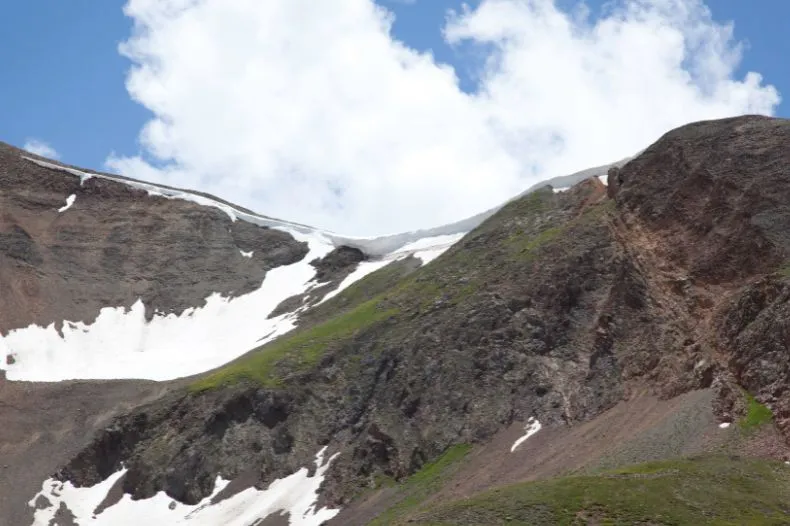
Astronomy enthusiasts who venture outside of Denver can visit neighboring dark sky villages that are committed to maintaining the unspoiled splendor of the night sky. The Sangre de Cristo Mountains’ Westcliffe and Silver Cliff are two particularly notable examples.
These localities are well-known for their dedication to reducing light pollution and for offering the best possible circumstances for stargazing.
Westcliffe and Silver Cliff provide an immersive experience where the brilliance of stars, planets, and galaxies glows brilliantly against the inky canvas of the night by embracing outdoor lighting approaches that value darkness.
The stargazing experience in these dark sky towns is further enhanced by nearby observatories and astronomy events.
Amidst the peace of Colorado’s mountainous surroundings, guests can take part in guided tours, workshops, and night sky photography sessions to fully immerse themselves in the wonders of the cosmos.
As models of dark sky communities, where the night sky takes center stage, Westcliffe and Silver Cliff call to people looking for a break from the city’s glare and a closer relationship with the universe.
Approx Travel Time: 4 hr 1 min
Distance: 241 miles
Curecanti National Recreation Area
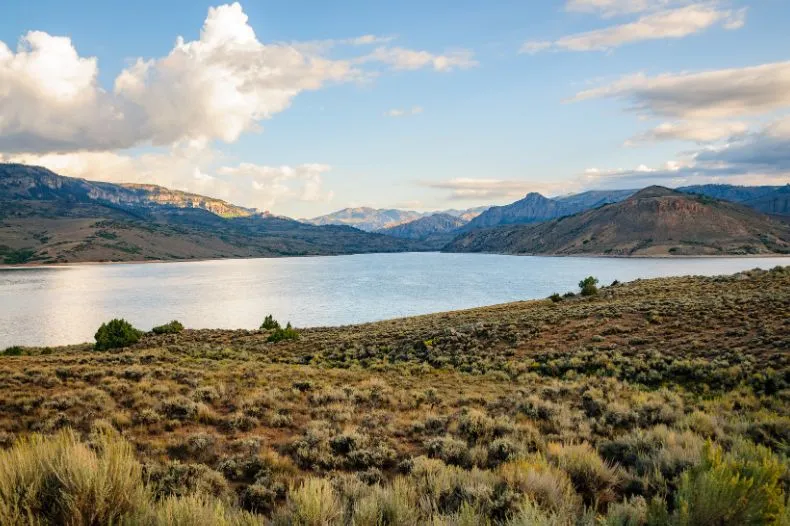
Curecanti National Recreation Area is well-known for its breathtaking reservoirs, steep canyons, and outdoor activities, but it also offers a fascinating chance for stargazers. This expansive recreation area, tucked away amid Colorado’s untamed landscapes, provides a tranquil setting for taking in the sky’s beauties.
The comparatively dark skies of Curecanti, away from the dazzling lights of the city, make it the perfect place to stargaze. Whether you’re spending a peaceful evening by the lake or camping among the reservoirs, the vast night sky is filled with planets, constellations, and the Milky Way.
Schedule your visit during a meteor shower or other celestial event for an even better experience. Curecanti National Recreation Area’s serene surroundings make it possible to immerse oneself in the sky, and the stars’ reflections on the reservoirs give even more magic to the night.
Curecanti is a fascinating destination for nature lovers and astronomy aficionados alike. Don’t miss the chance to direct your eyes skyward by night while you explore the recreation area’s different landscapes by day.
Approx Travel Time: 3 hr 52 min
Distance: 216 miles
Mount Evans
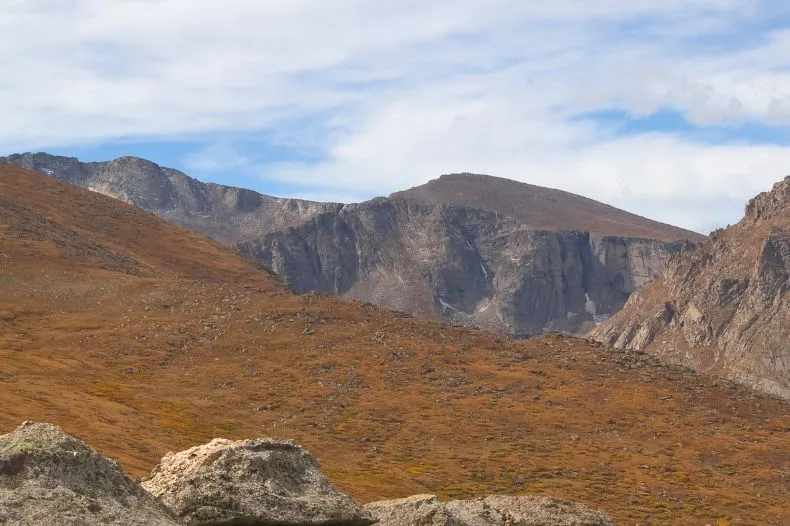
Explore the spectacular heights of Mount Evans, one of Colorado’s famous fourteeners, for an unmatched stargazing experience. Though most known for its expansive vistas during the day, Mount Evans also provides a magnificent nighttime show.
Mount Evans, which is more than 14,000 feet high, offers a unique perspective over a large portion of Earth’s atmosphere. As a result, there is less light pollution and pristine, pure skies for a great stargazing experience.
A cosmic view featuring stars, planets, and the huge Milky Way is available from Mount Evans, whether you plan a nighttime adventure or climb the peak during the day and spend the night there.
Always check the weather before you go, and wear layers of clothing because even in the summer, it can get cold. A must-visit location for anybody looking for an elevated cosmic experience close to Denver, Mount Evans offers the opportunity to embrace the peace and quiet of the peak while gazing into the universe.
Approx Travel Time: 2 hr 3 min
Distance: 105 miles
Dinosaur National Monument
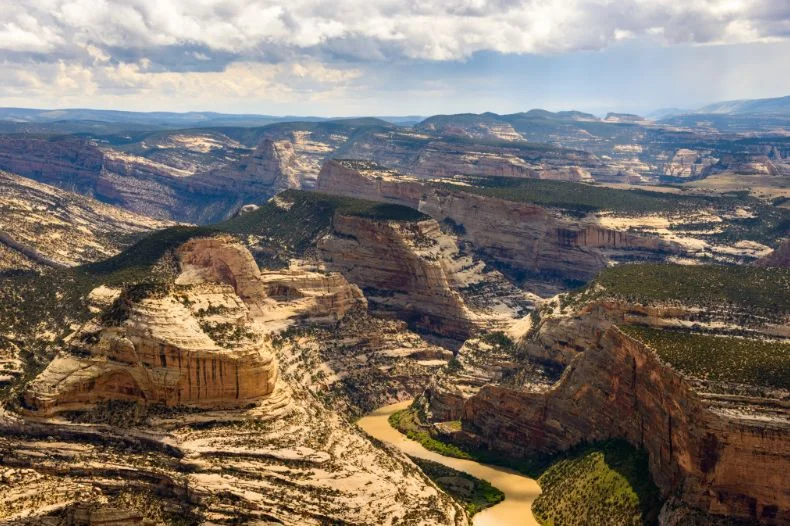
The Dinosaur National Monument is a fascinating place for stargazers, even though it is mostly known for its fossil-rich landscapes. This vast monument offers a distinctive fusion of cosmic grandeur and prehistoric wonders, nestled on the boundary between Colorado and Utah.
Relatively dark sky, away from the glare of the city, make Dinosaur National Monument an ideal place to stargaze. The stunning view of the Milky Way, planets, and constellations against the backdrop of prehistoric rock formations is available to visitors.
If you want to extend your stargazing experience, think about camping inside the monument. An intense and peaceful stargazing experience is made possible by the high desert’s isolation and the lack of artificial lights.
Make careful to see if there are any planned night sky programs or events run by the park rangers that provide information on the celestial marvels that may be seen from this isolated spot.
Dinosaur National Monument is a singular location where the wonders of the past and the cosmos coincide harmoniously for those wanting a heavenly trip tinged with the resonances of Earth’s ancient history.
Approx Travel Time: 4 hr 50 min
Distance: 297 miles
Cherry Springs State Park
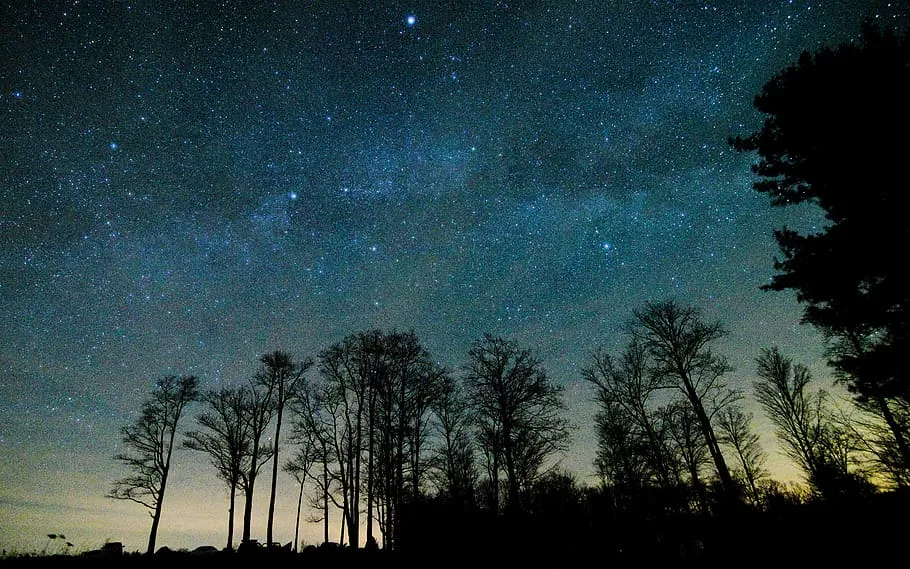
Cherry Springs State Park in Pennsylvania is a stargazing enthusiast’s dream come true for those up for an amazing journey, even though it’s not located in Denver.
The park is well-known for its extraordinarily dark skies, which provide an unmatched chance to see the wonders of the cosmos, especially the breathtaking Milky Way.
As evidence of its dedication to reducing light pollution, Cherry Springs has been named a Gold-Certified International Dark Sky Park. The park’s isolated position guarantees that there is no disruption from city lights, which makes it ideal for closely and clearly seeing celestial occurrences.
Cherry Springs is the best place for stargazing in Denver and astronomers alike for its yearly Astronomy Field Day and other events. These get-togethers offer a social setting for exchanging wisdom and admiring the night sky’s magnificence.
Cherry Springs State Park is a heavenly pilgrimage for those looking for an intense astronomy experience, where the universe shows itself in all its unadulterated grandeur, even though getting there means traveling outside of Denver.
Approx Travel Time: 23 hr 13 min
Distance: 1578 miles
Celestial Events Calendar
Keep an eye on the calendar of celestial events to make the most of Denver’s celestial delights. Throughout the year, Denver’s bright skies make for the perfect setting for seeing a variety of cosmic occurrences.
Watch out for lunar eclipses, planetary alignments, and other astronomical occurrences, as well as meteor showers like the Perseids in August and the Geminids in December. These events present excellent chances to see the universe in action.
A website devoted to astronomy calendars or an app like Stellarium can help keep track of impending events and celestial highlights. Whether you’re visiting observatories, dark sky communities, or the higher landscapes around Denver, schedule your stargazing excursions around these dates to experience the magic of the night sky.
When you time your stargazing excursions to coincide with astronomical events, you can get the most out of your experience and see the universe’s amazing displays against the clear sky of Denver.
How Wonderful Is Denver’s Stargazing?
Denver’s high height of 5,280 feet makes for excellent stargazing because it limits air interference and light pollution. The Mile-High City is the perfect urban location for amateur and experienced astronomers due to its beautiful sky, which offer exceptional visibility for celestial studies.
Strategic sites like observatories, Red Rocks Amphitheatre, and neighboring black sky villages improve the overall stargazing experience, even though some urban illumination still remains.
Denver’s dedication to maintaining black skies and its closeness to locations for higher-altitude stargazing make for an enjoyable celestial experience for those who like stargazing.
The Best Seasons in Denver to Go Stargazing
Denver has good stargazing conditions all year round, however some seasons are better than others.
Fall (September to November): Fall offers great visibility for stargazing with its clear, cool nights and low humidity levels. Overall, outdoor observations are more comfortable because of the lower temperatures.
Winter (December to February): Although it brings low temperatures, the air is typically crisp and dry. It’s the perfect season for stargazing, especially if you can survive the cold weather, because the decreased humidity levels lead to brighter skies.
Spring (March until May) : Spring brings a change from winter to milder weather. It’s a great time of year to stargaze because of the clear skies and cooler temperatures, plus you can see constellations like Orion and the Pleiades.
Summer (June to August): Summer nights might have higher humidity levels even though they are typically warmer. Nevertheless, Denver’s altitude frequently reduces atmospheric interference, making it a fantastic place to see stars. Meteor showers and other celestial occurrences occur in the summer.
In the end, you may enjoy the best stargazing in Denver all year long, although the experience is enhanced during seasons with lower humidity and clearer skies.
Conclusion
In conclusion, these are the best stargazing in Denver, ranging from famous locations like Red Rocks Amphitheatre to observatories and dark sky neighborhoods.
The Mile-High City offers an incredible astronomical playground that is just waiting to be discovered, whatever of your level of experience. So take out your telescope, find some high-altitude terrain, and watch the wonders of the universe open up above you.
